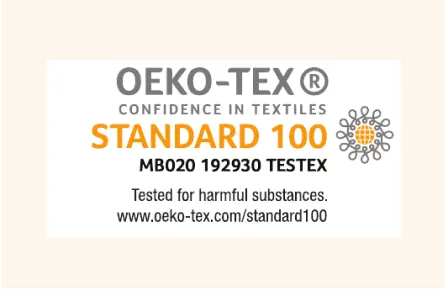Our choice of fibres and our product design influence our environmental footprint. We know much of this impact stems from the raw materials we use, so we take the time to understand their impact, from how they are grown to their end of life. Our goal is to source fibres that support healthy agriculture practices or meet circular design principles.
Protecting our natural environment informs our business decisions, and we’re constantly striving to help protect natural ecosystems and biodiversity, promote soil health, reduce water use, protect waterways and become emissions positive. While there are many impacts we can’t control, we can influence change through our choice of materials and the supply partners.

Sustainable Fibres
Our designers use the Modibodi Preferred Material Standard as a guide when sourcing fabrics to help ensure our products are responsible, long-lasting and leak-proof. This standard considers the whole value chain from farm/extraction through to fibre processing, consumer use, and end of life.
In 2022, we are transitioning 90% of our main fabrics to Preferred and Better fibres.
Modibodi Preferred Material Standard
PREFERRED
Recycled, renewable fibres that are high quality, biodegradable, processed with minimal chemicals and responsibly produced and processed. If the fibres are virgin, the fibres should be traceable through supply chain back to raw material production and grown with regenerative practices and ensure social sustainability. Choosing fibres that are recyclable is also important.
BETTER
Fibres that meet two or more of the following criteria: renewable, recycled, durable, reduced chemical and/or water processing, biodegradable, traceable or responsibly grown.
GOOD
Today’s better choice. Renewable fibres or recycled fibres that meet at least one of the following criteria: durable, biodegradable, traceable or responsibly processed.
DO NOT USE
Fibres that do not meet our standards include those that are low quality, highly polluting at production, use and end-of-life stages, non-biodegradable and non-recyclable.
Chemicals
In 2022 we will review chemicals within our supply chain to move suppliers to comply with the ZDHC restricted substance list. Our use of organic standards and the Modibodi Fibre Standard helps us monitor chemical use and proactively move to alternative solutions. By the end of 2022 we will transition to bamboo lyocell which uses a closed loop production processes that reuses solvents and reduces waste water.
All our products are Standard 100 by Oeko-Tex® certified as free from harmful substances to human health including allergens and carcinogens. Our certificates cover Class1 for baby products, Class 2 recycled products, organic products and other fibres.
Our fabrics treatments are also BlueSign approved.






Better Packaging
Modibodi strives to create a lighter footprint on the planet everyday. We recognise that packaging is another opportunity to protect the planet by keeping Ancient and Endangered Forests standing and out of the packaging supply chain. We are very proud to work with Canopy’s Pack4Good campaign to source Next Generation alternatives. In 2022, we will implement our Canopy Package4Good policy in the procurement of paper products and man-made cellulose fabrics, including a focus on the redesign and reuse of cardboard shipping boxes.
Our current cardboard sleeve product packaging and boxes are Forests Stewardship Council (FSC)certified and made from a minimum of 75% recycled paper (max 10% FSC paper, water and starch) and can be recycled after use.
To deliver our products to you dry, safe and without plastic, we use compostable ComPOST parcel bags, which are made from GMO-free renewable plants and compostable resin. The Better Packaging Company is a certified B Corp and certified Climate Positive, offsetting their own carbon emissions by 120%.
Top Tip
Once you’ve opened it, cut off the postal stickers and pop it into your compost bin with your food and garden waste, or add it to a commercial compost collection - soon enough, the worms will be eating it for breakfast.
Remember ComPOST bags are NOT for recycling – that's a whole other process!








